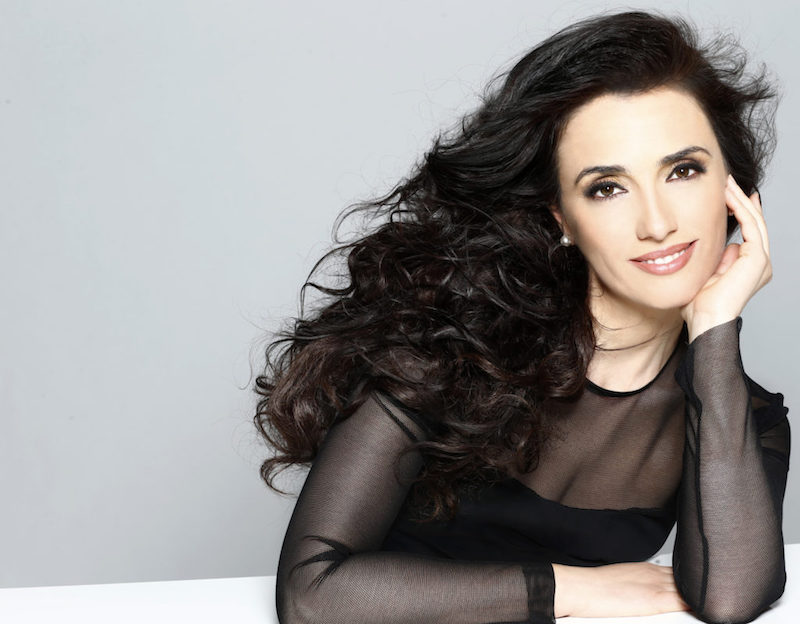When dictators stifle dissent, the art which survives is music, and it’s no surprise that the soprano recently taking London’s Royal Opera House by storm should have been born and bred in Enver Hoxha’s Albania. Ermonela Jaho recalls with affectionate amusement the paranoid, isolationist atmosphere in which she grew up: with one single television channel, and one state-approved comedian (Norman Wisdom, a Londoner); with baby boys being named Adriatik after the sea they had to cross to make their fortune; with hundreds of thousands of pill-box bomb-shelters studding the landscape; but also with a heady form of polyphony which has been sung at village weddings since antiquity.
Jaho may be diminutive but she has great magnetism on stage, the beauty of her singing being complemented by an intense physical presence. When she sang the title role in Puccini’s Suor Angelica at Covent Garden in 2011 she drew an ecstatic audience response every night; reviewing her reprise of the role in March, the critics ran out of superlatives. Angelica has been committed to a convent as punishment for an illicit affair. In this cruel drama she learns that her illegitimate son has died; she poisons herself, and dies praying for salvation. Jaho’s performance develops compelling momentum as shock reduces her to a seemingly lifeless corpse before she gives way first to volcanic grief, and then to wounded-animal rage.
‘But that anger is also my anger,’ she explains. ‘When I sing, I draw on everything I have seen and heard in my life. I draw on the history of my country, and of my family.’ Her father taught philosophy and flew Russian MiG fighters; her mother was a teacher, but had been prevented through poverty from taking up the singing career she yearned for, and was perennially oppressed with a sense of failure.
 Ermonela Jaho – credit Fadil Berisha
Ermonela Jaho – credit Fadil Berisha
Born in 1974, Jaho always wanted to be a singer, but her initial ambition was to do so in the Albanian pop style – until at fourteen she went to a performance, in Albanian, of La traviata. ‘In that moment I saw a new horizon, a big door opening, and I wanted to go through it. And I wanted to show how Traviata should be done. I have now sung Violetta two hundred and thirty-two times, and every time I am giving more of my life-story through it – it always feels new. I see Ermonela the artist growing up through it.’
She’s forceful and humorous, her ideas tumbling out unstoppably; in close-up she has an earthy beauty, with no hint of divadom. She frequently refers to herself in the third person, as though watching her own progress with an objective eye: in later life she intends to spend more time as a voice teacher – she already does this on her frequent trips back to Tirana – inculcating in younger singers the discipline which has allowed her to reach the heights without straining (and ruining) her voice.
On her way to those heights she had a series of lucky breaks, the first being when the Italian soprano Katia Ricciarelli spotted her in a master-class at the Tirana conservatoire, and invited her to study in Italy, where she spent the next ten years building a career. She married a childhood friend who was living in New York, and still lives there during the two months each year when she’s not travelling.
Her breaks in London have followed a time-honoured pattern, stepping in for Anna Netrebko as Violetta at Covent Garden in 2008, and for an indisposed Anja Harteros as Suor Angelica in 2011. Though when that invitation came through, at exceptionally short notice, she hesitated: she wanted to make the role her own, but her parents had both recently died, and she was too traumatised to even cry. But singing the part was cathartic. ‘When I come to the end of Suor Angelica I feel so naked and empty it’s like I’ve died, I have to force myself to go to get the applause. Sometimes I don’t even feel the ground under my feet.’ Each time, she says, feels like the first and last show of her life, and she has no thought for the morrow. ‘I just think this is my moment, I’m living my dream, a gift from the gods.’
Over the next two years in London, New York, Washington, and Paris she will be giving many performances in the title roles of Traviata and Madam Butterfly, but she knows her vocal limits – she’ll never do Wagner. This week she carried off the Readers’ Prize in Opera Magazine’s International Opera Awards – confirmation that no other singer has moved audiences as she has done. Next month, Opera Rara will release their recording of Leoncavallo’s Zaza, the verismo tragedy of a music-hall singer which depends totally on the charisma of its star: only when they found Jaho did the record company feel they could risk doing it. This will be her recording debut, and she finds the work full of echoes of her mother’s plight: ‘Some of Zaza’s lines I heard like a refrain from my mother, when I was a child. Singing this part was like having a knife go through my soul.’
[A version of this article appeared in ‘The Economist’]